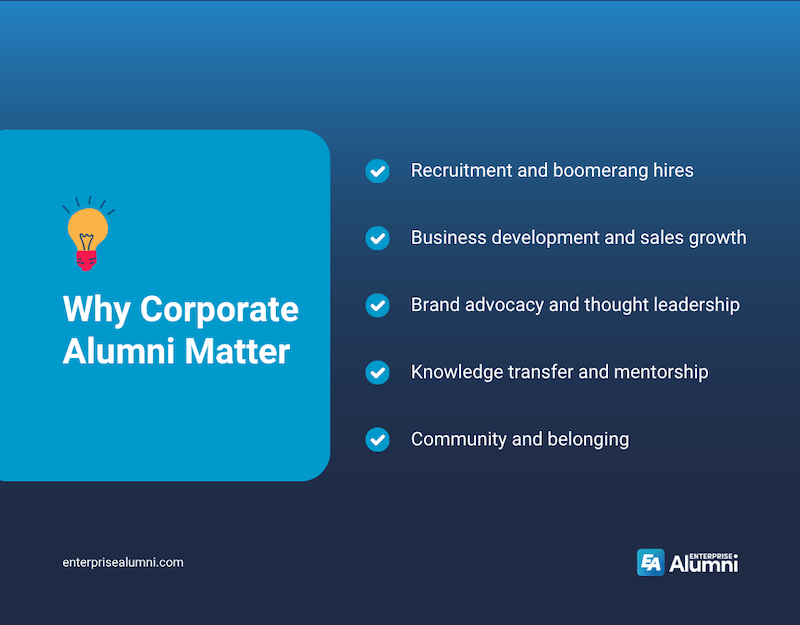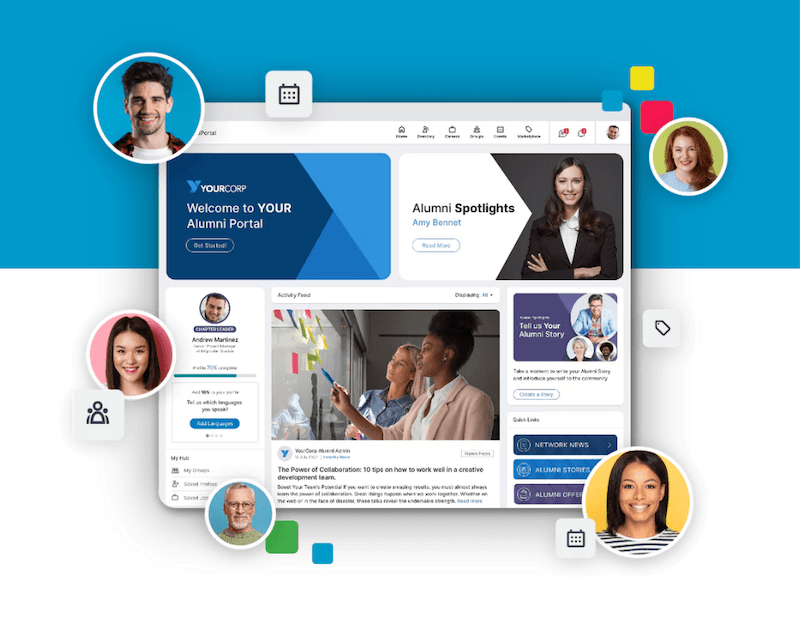University Alumni vs Corporate Alumni: What Enterprises Need to Know
Explore how corporate alumni differ from university alumni and why companies rely on alumni networks for recruiting, business development and...
Read more
Wondering what an alumni is? Learn about how corporate alumni networks drive ROI, and why EnterpriseAlumni is the leading platform to build and manage them.
When people hear the word “alumni,” most think in the context of universities.
But in the modern workplace, the definition of alumni has expanded. Businesses and enterprises now recognize that their former employees, contractors, and interns are more than just people who “used to work here.” They are alumni—valuable members of a lifelong community that can influence recruitment, business growth, and brand reputation.
In this post, we define what alumni means, explore its evolution into the corporate world, and explain why alumni matter for organizations that want to build sustainable business outcomes. 
The word “alumni” comes from the Latin alere, meaning “to nourish.” Historically, it referred to someone who had been nurtured by an institution, most commonly, a university or school.
Today, the term applies more broadly. Anyone who attended, worked with, or had a formal relationship with any organization can be considered an alum.
In recent decades, organizations beyond academia, including corporations, nonprofits, and professional associations, have adopted this concept. The gig economy, fluid careers, and global mobility mean people move between employers more often. Yet the relationship doesn’t end on a resignation date.
Modern enterprises view alumni as former full-time employees, part-time staff, contractors, gig workers, interns, volunteers and retirees.
The shift reflects a recognition that all these individuals can continue to contribute value long after their formal employment ends.
Corporate alumni are people who previously worked with a company in some capacity and maintain an ongoing connection with it. Unlike university alumni, whose relationship is defined by education, corporate alumni relationships are defined by shared professional experience.
Corporate alumni take various forms:
Research shows the value of maintaining these relationships. For instance, boomerang employees have been found to show 44% higher three-year retention rates compared to new hires. Some companies report that alumni referrals and rehires can fill up to 20% of open roles.

Corporate alumni networks deliver measurable benefits across the business. Here’s why forward-thinking enterprises invest in them.
Rehiring alumni reduces both cost-to-hire and time-to-hire. Alumni are already familiar with company systems, values, and culture, so they ramp up faster than external candidates. They also bring fresh expertise gained from other roles, adding immediate value. Studies show alumni hires are more loyal and stay longer, helping reduce turnover and onboarding costs.
Alumni often go on to become decision-makers, clients, or partners at other organizations. That’s why a strong alumni relationship is so important; it can open doors to new contracts, strengthen customer loyalty, and accelerate deal cycles.
When a company invests in alumni engagement, it creates a network of trusted advocates who can directly influence revenue growth.
Alumni are among the most credible voices an organization has to offer. When former employees speak positively about their experience, it strengthens employer branding and helps attract top talent.
An alumni network can also extend the company’s reach on social channels, share success stories, and act as ambassadors for CSR or sustainability initiatives, boosting corporate reputation and visibility.
Corporate alumni are a deep well of expertise and knowledge. Retirees, former leaders, or technical specialists can mentor current employees, support innovation projects, and help preserve institutional knowledge. This mentorship loop means that valuable insights can stay within the company, even when people leave the business.
Perhaps the most important point: alumni want to stay connected. Surveys show alumni are interested in more than just job opportunities—they want to engage in cause-driven projects, mentoring programs, diversity initiatives, and professional communities. By giving alumni a space to belong, companies strengthen engagement and long-term loyalty.
 Deciding to build an alumni network is only the first step. The real challenge, and opportunity, comes in managing that network effectively.
Deciding to build an alumni network is only the first step. The real challenge, and opportunity, comes in managing that network effectively.
Successful alumni programs need more than a directory or newsletter. They require the right technology, features, and workflows to keep people engaged, create measurable business value, and scale with the organization.
That’s where our software comes in.
Our software includes tools for events, groups, and messaging that help organizations foster meaningful alumni connections. Companies can launch virtual or in-person events, create interest-based groups, and send targeted updates—all within one platform. These features keep alumni engaged with the brand and encourage them to act as advocates.
EnterpriseAlumni offers job boards, career tools, and automated workflows that surface opportunities directly to alumni who are the best fit. This makes it easier to rehire proven talent, attract high-quality referrals, and speed up recruitment cycles while reducing hiring costs.
It’s hard to gauge the success of an alumni program without data. Dashboards and AI-driven insights give leaders much-needed visibility into alumni activity. By tracking logins, event attendance, job applications, and referrals, organizations can refine their engagement strategies and demonstrate measurable ROI.
Our software connects with HRIS, ATS, and CRM systems, so data flows securely between platforms. This ensures alumni communications are always accurate, timely, and personalized, supporting stronger recruitment, engagement, and business development outcomes.
EnterpriseAlumni is built with enterprise security and compliance at its core. Features include GDPR/CCPA compliance, data privacy controls, and mobile-first access, giving global organizations confidence that their alumni community is managed safely and at scale.
When you invest in an alumni program, you want to see clear results. Here are the business-aligned metrics that you can track.
These data points translate into ROI. For businesses and organizations, that means lower recruitment costs, stronger retention, and increased revenue through alumni-driven opportunities.
The definition of alumni has shifted. Once limited to university graduates, it now encompasses corporate alumni: former employees, contractors, interns, and more. For enterprises, this is more than semantics. Alumni are a powerful community that fuels recruiting, retention, business development, and advocacy.
Forward-looking organizations no longer ask, “What is an alumni?” They ask, “How can we build and sustain an alumni community that drives measurable outcomes?”
Start building your alumni program with EnterpriseAlumni.
NEWSLETTER


Explore how corporate alumni differ from university alumni and why companies rely on alumni networks for recruiting, business development and...
Read moreDecember 9, 2025
Your focus should be on 'How' to launch a corporate alumni network, not 'If' - for its competitive advantage, insights and community building.
Read moreNovember 6, 2025
Starting a Company Alumni program from scratch means recognizing no program suddenly conjures a herd of former employers stampeding to return.
Read moreJune 23, 2025
Build new revenue streams, save on recruitment and enhance your employer brand, all through the power of alumni.